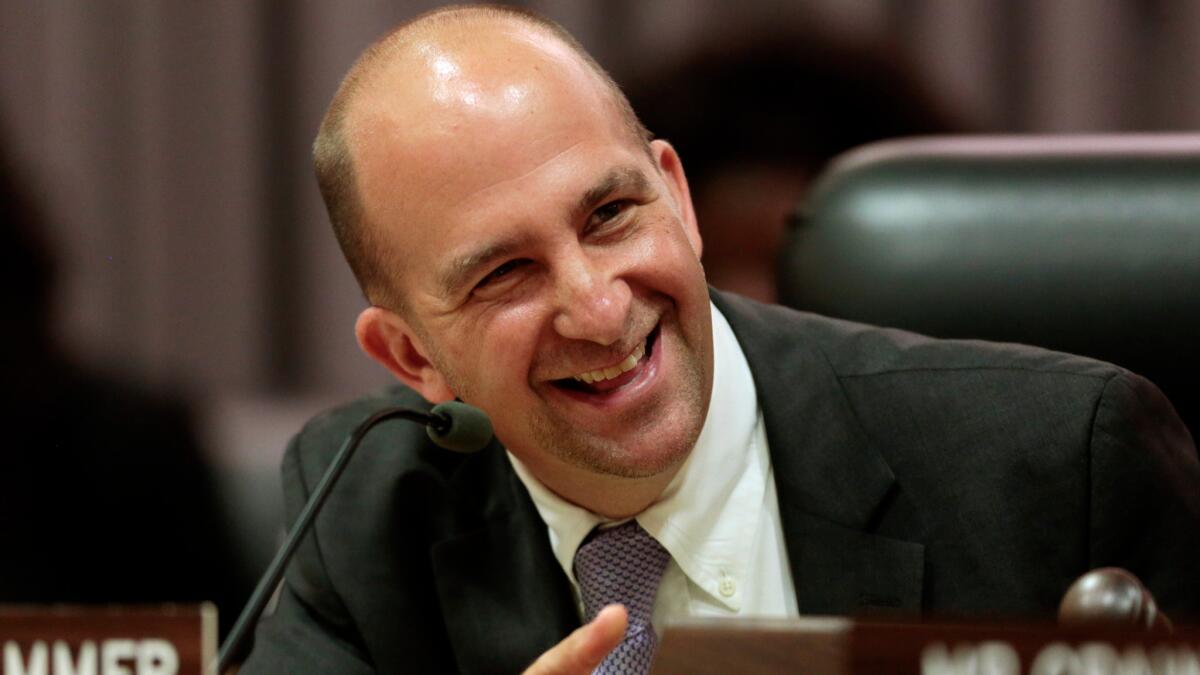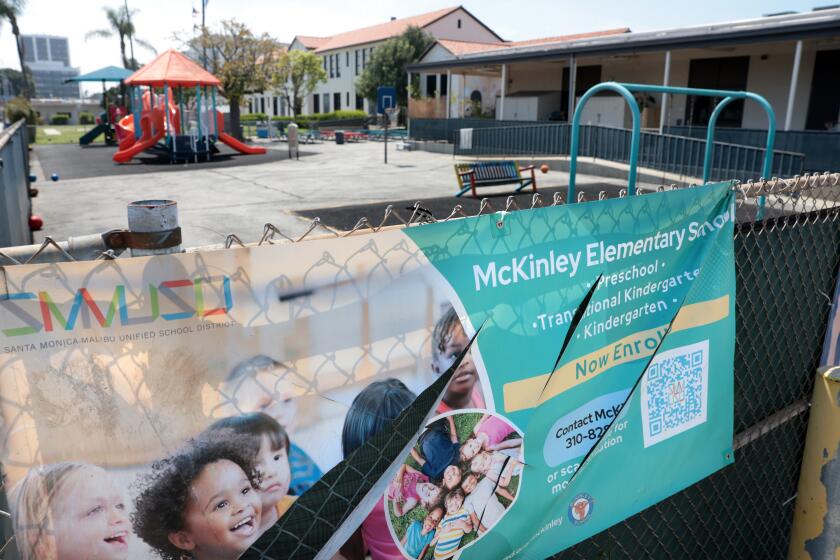L.A. Unified board reelects Zimmer as president — with an admonition to keep meetings on time and shorter

Something about electing Steve Zimmer as president of the Los Angeles Board of Education president inspires lectures from his fellow trustees.
On Wednesday, just before they unanimously elected him president for a second year, Zimmer’s colleagues on the seven-member body urged him to master brevity — for the sake of their own patience and schedules and, more important, out of respect for the public.
As he had last year, when offered different advice, Zimmer said he would follow the guidance.
The president has no greater authority than the other six elected board members but can assert considerable influence. The president often serves as a public representative of the nation’s second-largest school system and manages the board’s public and closed-door meetings.
While his colleagues stressed conciseness, Zimmer emphasized teamwork as the watchword for a district that has made progress but still suffers from low academic achievement.
“If there’s any theme that I’m talking about, [it] is that we have to do this together,” said Zimmer, who was unopposed. “It’s not these kids or those kids, but our kids.”
Follow the Times’ education initiative to inform parents, educators and students across California »
In his first year, Zimmer frequently became the public face of resistance to a proposal, spearheaded by local philanthropist Eli Broad, to move at least half of district students into charter schools, based on the premise that the school system performed abysmally.
Charters are publicly funded but operated outside of district control, and in recent years, L.A. Unified has lost thousands of students — and the state funding they bring with them — to these schools.
The Broad proposal evolved into a plan to create new, excellent schools of any kind, although charters remain a central component.
Zimmer personally was a staunch opponent of the charter expansion but tried to modulate his tone when speaking for the board, whose members have a diversity of perspectives.
Zimmer’s effort at restraint was in line with what his colleagues advised last year, when they elevated him to president with varying levels of enthusiasm as a compromise choice. They’d told him he would need to improve at building consensus, welcoming those with differing politics and approaches to education, and speaking for the board as a whole.
This week, their focus on brevity suggested that Zimmer, a former teacher, had at least earned passing grades on last year’s assignment.
Zimmer took an indirect shot at district critics when he said L.A. Unified needs to resist any narrative that paints the district as a failure, even while maintaining a sense of urgency on behalf of students who are not achieving.
Over the last year, Zimmer oversaw the process to replace outgoing Supt. Ramon C. Cortines. In January, the board unanimously selected Chief Deputy Supt. Michelle King.
Also, Zimmer was among the senior officials who pushed administrators to address a drastic decline in the percentage of students on track for graduation, a problem caused by higher academic standards. Months later, after districtwide credit-recovery programs, the school system projected a possible record graduation rate, but it isn’t clear that the higher standards survived.
In his remarks, Zimmer stressed the importance of maintaining rigor and getting every student to graduate, so that “we can take the word dropout and put it in the history books.”
He also urged the board to take on two particular challenges: early childhood education and true bilingualism.
Early education, he said, offers great hope for closing the gap in academic achievement that separates whites and Asians from low-income blacks and Latinos, and speaking more than one language positions students to compete in the global marketplace.
Board member Monica Ratliff and others stressed the practical, such as keeping meetings on time so that members of the public did not have to wait hours to hear their issues discussed or voted on.
“You wear your heart on your sleeve, and you’re a very good person, but let’s be more efficient,” said Ratliff.
Zimmer said he got the message, but that did not stop him from speaking for 20 minutes.
Richard Vladovic, who’d nominated Zimmer, could not resist a little chiding.
“Brevity is the word, Steve,” Vladovic said. “That is not a good example.”
Twitter: @howardblume
Editor’s note: Education Matters receives funding from a number of foundations, including one or more affiliated with an individual mentioned in this article. The California Community Foundation and United Way of Greater Los Angeles administer grants from the Baxter Family Foundation, the Broad Foundation, the California Endowment and the Wasserman Foundation. Under terms of the grants, The Times retains complete control over editorial content.
MORE EDUCATION NEWS
Cloning great schools is latest in long line of L.A. reform plans
After months of negotiations, a nonprofit will manage 20th Street Elementary School
Eric Garcetti wants college applications to stop asking about students’ criminal records
UPDATES:
3:26 p.m.: This post was updated with additional information from the meeting and more background information about issues confronted by L.A. Unified over the past year.
This story was first published at 1:52 p.m.
More to Read
Start your day right
Sign up for Essential California for news, features and recommendations from the L.A. Times and beyond in your inbox six days a week.
You may occasionally receive promotional content from the Los Angeles Times.







